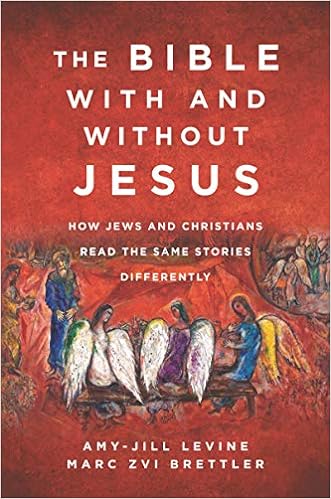|

book-cover art, Marc Chagall’s Abraham and the Three Angels (1966)
THE BIBLE, in the singular, does not exist; different communities have different Bibles.
We don’t mean that they prefer different translations but that they have Bibles comprised of different books, in different orders, in different languages.
The biggest difference is between the Jewish and Christian communities, for only Christians have a New Testament. In fact, only Christians have an “Old Testament,” which itself differs among the various Christian communions. Jews have the Tanakh, and although the Old Testament and Tanakh share books, the communities interpret the shared verses differently...
Christians read their Old Testament through the lens of the New Testament, and Jews read the Tanakh through the lens of postbiblical Jewish commentaries...
who is the Bible's main character
These differences raise major interpretive questions. For example, who is the Bible’s main character? Is it God? Is it Jesus? Does it lack a main character? What is its main point, or is there one? Does the “original” meaning of a passage, apart from Christian or later Jewish interpretation, still have anything to say to us? Different interpretive communities answer these questions differently...
As the early followers of Jesus, reflecting on the proclamation of his resurrection, turned to books such as Isaiah, Jeremiah, and Psalms more fully to understand their risen Lord, they found throughout the ancient sources new meaning. Instead of asking what the texts meant in their original contexts, they asked what the texts meant to them, in their own lives centuries later. Jews throughout the ages have done the same.
They looked to their ancient scriptures to understand practices such as honoring the Sabbath and aiding the poor, as well as postbiblical events such as the destruction of the Jerusalem Temple by Rome in 70 CE and later their persecution by Christians. In this turn to scripture, Jews and Christians also fought like family members over the disposition of their parents’ legacy.
Each claimed the scriptures for themselves, and in doing so they read the texts not only as sources of comfort and inspiration but also as sites of contention and polemic...
so many bibles
THE IMPRECISE TERM “Bible” derives from the Greek ta biblia, “the books,” and it suggests that a particular collection of books has priority. There is no such thing as “the Bible”; different religious communities have different Bibles. The Samaritan community has only the Torah, the first five books of the Bible, as its Bible; it lacks works such as Jeremiah and Psalms...
Nor is the Old Testament the same for all Christians. The Roman Catholic, Anglican, Eastern Orthodox, and Assyrian Churches include books written by Jews before New Testament times but preserved in Greek, such as Sirach or Judith, as part of their Old Testament. These books are typically called the “Apocrypha” by Protestants...
|